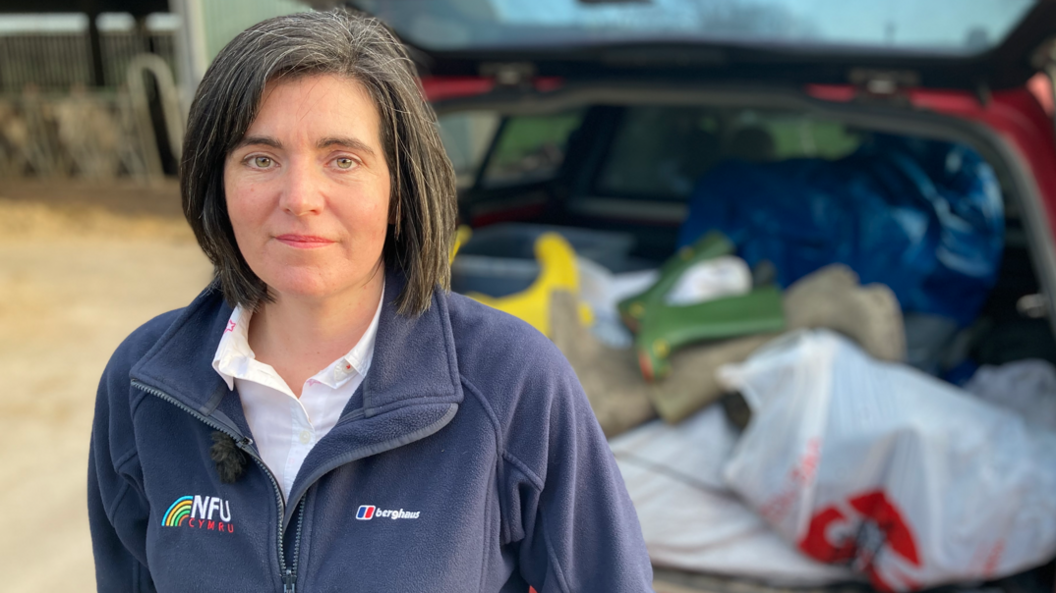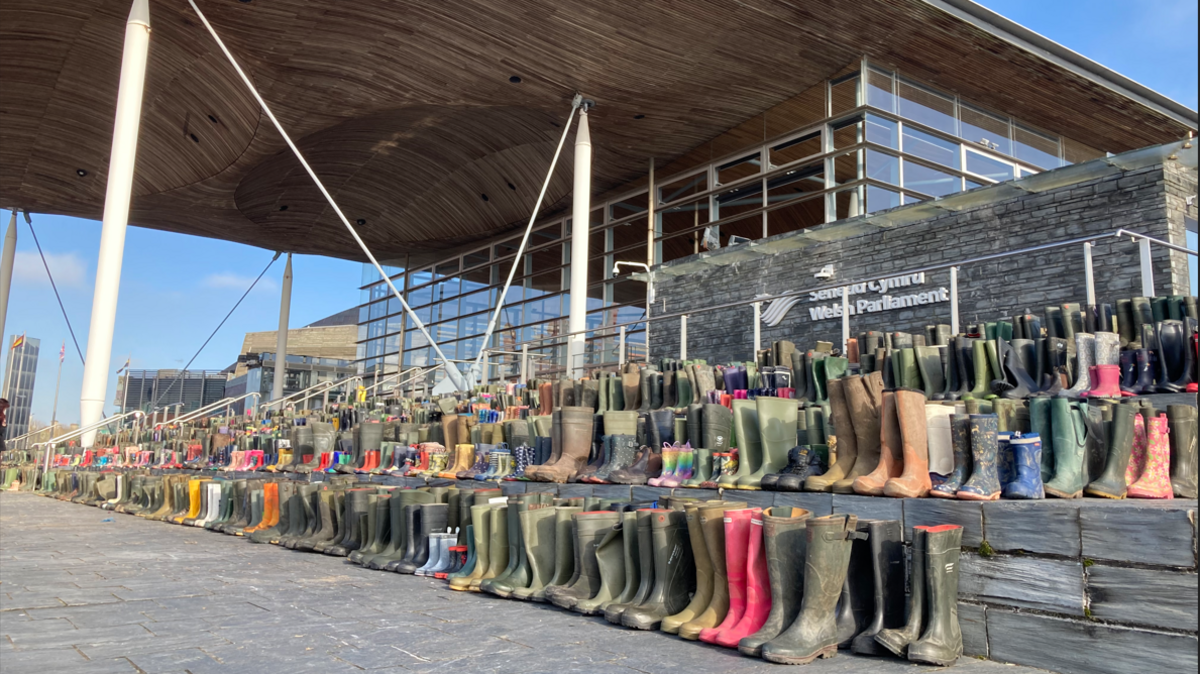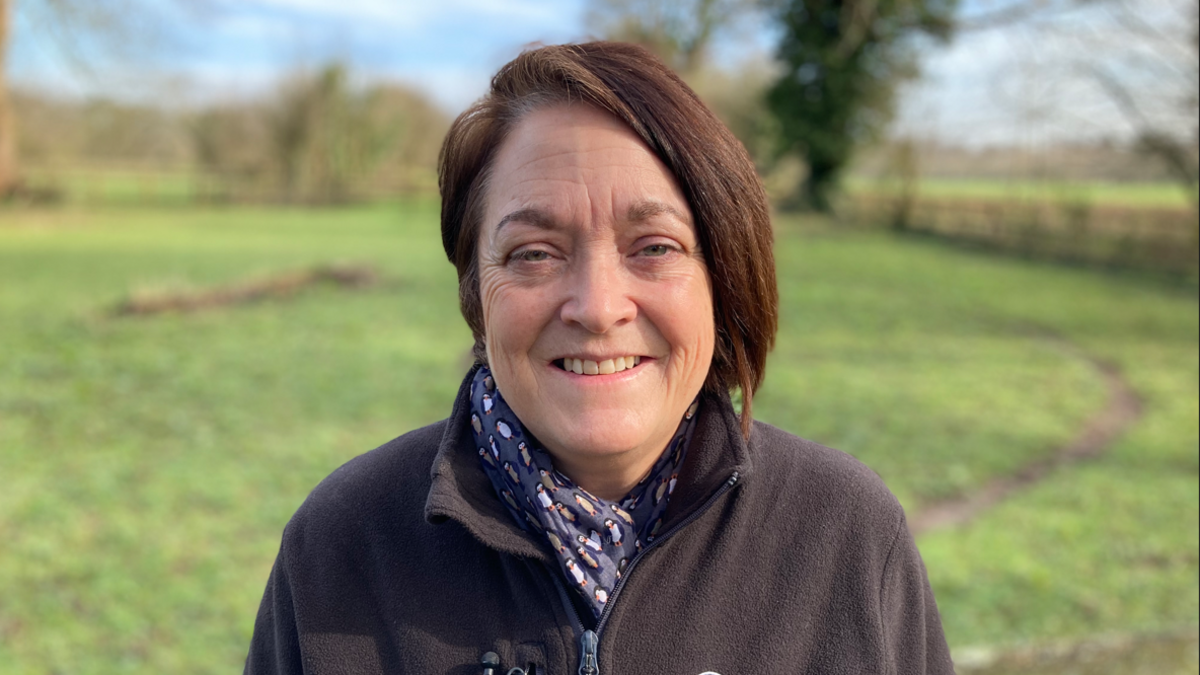Farmers leave thousands of wellies outside Senedd
Thousands of wellies have been placed in front of the Welsh parliament
- Published
Protesting farmers have placed 5,500 wellies outside the Senedd in the ongoing row over subsidy payments.
Organisers called it a "powerful and emotional" display representing projected job losses from the changes.
A public consultation on the Welsh government's controversial Sustainable Farming Scheme, external (SFS) is set to close on Thursday.
Rural Affairs Minister Lesley Griffiths said she does not want to see "a single job lost" as a result of the plans.

Farmer Paul Williams said his whole family had responded to the consultation
Environment groups described the scheme as vital for addressing nature loss and climate change, but called for farmers to receive adequate funding.
The SFS is set to replace EU-era agricultural subsidies from 2025, but has prompted mass protests across Wales.
It requires farmers to have 10% tree cover on their land, and manage 10% as wildlife habitat.
The aim of the protest is to "illustrate the impact of 5,500 job losses" said Paul Williams, a beef farmer from Llanrwst, Conwy, who added: "You can't really take that in until you see it visually like this on the steps of the Senedd."
He said all farmers were willing to plant more trees, but he could not commit to 10%.
Thousands of protesting farmers descend on Cardiff
- Published28 February 2024
Why are farmers in Wales ready to protest?
- Published28 February 2024
Protesters parade coffin at big farm change demo
- Published8 February 2024
An economic impact assessment commissioned by the Welsh government and published alongside the latest consultation sparked the row.
It suggested if all farms took part, it could see a 122,000 reduction in Welsh livestock units and an 11% cut in labour needed, which agricultural union NFU Cymru claimed would be like losing 5,500 jobs.
The Welsh government argued the analysis was already "out of date", and reflected an earlier version of the scheme, not taking into account the full range of funding plans being proposed.

Abi Reader from the NFU Cymru union dubbed the scheme "misguided at best and crazy at worst"
"It's really driven home just how much is at stake," explained NFU Cymru's Deputy President Abi Reader.
"We cannot allow our rural communities to fall foul of a policy that is misguided at best and crazy at worst."
The union had asked farmers to donate old wellies for their display in front of the Senedd, and Ms Reader said the response had been "incredible".

Farming unions have said a controversial subsidy scheme will be unworkable and unfair
Issue being 'misunderstood'
Nigel Pugh, campaigns lead for the Woodland Trust in Wales, said there had been "a lot of misunderstanding" about the issue.
On average, Welsh farms already have between 6% to 7% tree cover and there is flexibility within the rules to help those who would find tree-planting challenging, he explained.

Rachel Sharp said we are in "a nature crisis”
Wildlife Trusts Wales Chief Executive Rachel Sharp insisted the habitat requirements were not about taking land out of food production.
Wildflower meadows would count as part of the 10%, while still being grazed and providing hay as winter feed for livestock, she added.
"We've seen around a 98% decrease in wildflower meadows (since World War Two)," she said.
"We are in a nature crisis."
However, both environmental organisations said that the scheme needed a big enough budget.
"If we want farmers to be custodians of the countryside we need to pay them and give them certainty going forward," Ms Sharp added.
A Welsh government spokesperson said: “Farming is very important to Wales and our economy and we want a successful future for Welsh farming."
They added it is "committed to continuing to work with farmers to develop the Sustainable Farming Scheme".
"This is a genuine consultation and no decisions will be taken about any element of the proposal, including how we achieve the requirement for habitat and trees, until we have conducted a full analysis of the consultation responses," the spokesperson added.